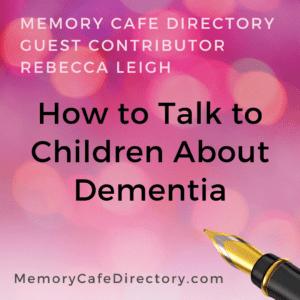Memory Cafe Directory posts and/or links to retailers can be advertising, sponsored, or affiliate links. We may earn a small commission from them. Thank you.
Has a loved one in your family been diagnosed with Alzheimer’s disease or other dementia? If this is the case, the diagnosis will have far reaching effects into the whole family.
That includes affecting your young children, who may initially not understand what this means. It can also affect your older children, depending of course on each child’s age.
It’s always important to communicate with children about dementia, as they’ll need to understand how this diagnosis will affect their relationship with that loved one. Here’s how to address the diagnosis with them, and how to help them understand what to expect about memory loss.
When To Start Talking About Dementia
When should you talk to your child about dementia, and how it will affect their relationship with your family member?
Typically it’s usually best to talk about dementia with young people as soon as possible, since this can be a difficult time for them. If the family member has been diagnosed in the early stages of dementia, then you can ask them if they want to be included in that conversation. If they want to be involved, they can talk to your child with you and tell them what may happen in the future.
If the person with dementia’s behavior changes noticeably, or they do something like call the child by someone else’s name, then it’s very important to talk to them as soon as possible. Children will pick up on these changes even if you don’t, and if it’s not addressed it can confusing for them. Giving them the context of the dementia diagnosis will help them understand what’s happening with their loved one.
Be Aware Of The Effects Of Dementia Yourself
If you want to help your child understand dementia, it’s important to understand it yourself. There are several types and each form of dementia is a bit different. However, a lot of the dementia symptoms are largely similar. If you’re aware of the symptoms, then you can pick up on and address them with your child when you need to.
The symptoms can include:
- Changes in memory and mood
- Problems with language, such as trying to find the right word
- Issues with concentration and understanding
- Difficulty with daily activities
- Managing behavior
- A variety of unusual behaviors
Using dementia resources such as the Memory Cafe Directory will be able to help you learn more about dementia, its symptoms, and the different ways it affects older adults.
In many cases, people with dementia may have mild symptoms at first, and they will progress over time. For your child, you may see that relative has less patience with them, or won’t want to play with them. For your child, that may be upsetting or disconcerting.
If you’re aware of the symptoms, you can watch out for them and address them with your child when any changes happen. Being able to talk to a young person about the changes as soon as they occur gives them context and understand why these things are happening with their loved one.
What To Say About Dementia
How should you address the idea of dementia, exactly?
It will always depend on your child and their age. The key is not to try and “dumb it down” for them, but of course communicate in simple terms. Children are intuitive, and will understand that things are being kept from them.
For younger children, you can tell them what dementia is, maybe explaining that it’s a brain disease and that they may notice some symptoms in their loved ones. For example, you can point out that grandma’s brain has a disease and they may see their loved one forget things, or find it difficult to stay organized.
If your child is older, the best way might be to get into more details. You may want to tell them about the exact type of dementia that their relative has, or the areas of the brain that are being affected. Having that information helps them conceptualize what’s happening with their mental health.
When talking about dementia, allow your child to ask questions about it. Allowing for this is a great way to help demystify dementia, and will help your child fill in the gaps in their knowledge.
Also, don’t be afraid to share your own feelings. Your child may feel upset or scared, and you’ll likely be feeling the same. Sharing that with them shows your child that they’re not alone in this, and that they can come to you if they need to.
Be Ready To Answer Your Children’s Questions
As young kids begin to be aware of how dementia is affecting their loved ones, they’re very likely to have specific questions about it. If they have questions, the best thing to do is answer them honestly.
You may feel as though you want to keep the dementia diagnosis from your child to protect them, but that actually can be harmful to them in the long run. That can lead to them worrying more about that loved one, so it’s usually better to be open with them.
There are some common questions that your child may have about their relative and the way they’re being affected by dementia. The way you answer them will depend on the age of your child, their own understanding, your own emotions, and your family dynamics.
Here are some ideas on how to answer them.
Why is Grandpa doing silly things?
“Because Grandpa has dementia, it can sometimes make him do silly things as he’s confused. It can upset him if you laugh, so why not help him instead?”
Has Grandma forgotten who I am?
“Grandma finds it difficult to get names right now because of her dementia, but she still loves you very much. She does really enjoy it when you go to visit her. Those are good times for her!”
Can I get dementia from Nana?
“No, dementia isn’t a disease that you can catch. Instead, it’s something that can happen as you get older.”
Will Auntie Jean die?
“Every person will die eventually. I know it’s sad to think about Auntie Jean dying, but we can still spend time with her and take care of her. When we next visit why don’t you tell her how much you love her?”
Take Advantage Of Resources
The great thing now is that there are lots of resources that help explain dementia to children. You can take advantage of this when you’re looking to explain dementia to your children. Some examples include engaging a social worker, a school counselor, a dementia specialist, or a dementia support group.
For example, there are a range of children’s books on the market that you can read with your child, so you can help them understand the disease. Both of these are available on Amazon for convenience. These include titles like Weeds In Nana’s Garden by Kathryn Harrison, which is for children aged under 7. There’s also The Dementia Diaries: A Novel In Cartoons by Matthew Snyman, which is for children aged 7 and over.
 |
 |
| Available on Amazon | |
There’s also videos and resources online developed by dementia charities, that are designed for children.
For simple, straightforward, 3-sentence definitions of terms related to dementia and caregiving, visit Dementia Map. Their Dementia Glossary is a valuable way to get the answers you need, in simple terms. Plus, many terms link to articles on their blog, so you can dig even deeper if you wish.
Dementia UK, for example, has a dedicated video on YouTube (see below) to help children with a loved one’s diagnosis. Additionally, the Alzheimer’s Association and Alzheimer’s Research UK have a wealth of information available.
Keep The Conversation Open
Over time, your loved one’s condition will change and develop. As such, your child may have more questions or need reassurance. You’ll want to keep communication open during these times, so your child will feel comfortable coming to you with any new questions that they have.
The important thing here is to reassure them that the behaviors they’re seeing are a result of dementia, and that the person still loves and cares for them.
When your loved one is diagnosed with dementia, it can feel daunting to try and address this with your child. If you’re honest about what is happening, and encourage your child to come to you with questions, then you’ll be able to make it easier for them to understand what’s happening.
About the Author
Rebecca Leigh
Rebecca Leigh is a writer with Best Essay services and Study demic. She covers health care topics, with a special interest in brain health. She’s also a contributor for sites like Simple Grad.
Become a Contributor!
 Do you want to be a Memory Cafe Directory contributor? If you have helpful information to share with our community, read about the guidelines, then get in touch to discuss what you have to offer.
Do you want to be a Memory Cafe Directory contributor? If you have helpful information to share with our community, read about the guidelines, then get in touch to discuss what you have to offer.
Thank you.




